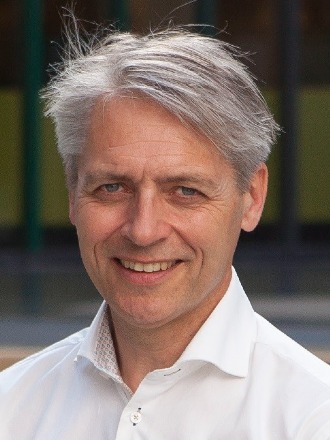‘Aletta Jacobs School as Google Maps for healthcare’

According to Erik Buskens, the new scientific director ad interim of the Aletta Jacobs School of Public Health, knowledge institutions should guide public policy. ‘Science is not only about acquiring knowledge, it should also serve society.’
Text: Jelle Posthuma
In the office of Buskens, full professor of Population Health Management, a map of Northeastern Netherlands (and Northwestern Germany) adorns his wall. This is no coincidence. A significant part of this region has a low socio-economic status, based on factors such as wealth, education level and labour market participation. People with a lower socio-economic status often display a less healthy lifestyle and experience a worse living environment than those with a ‘higher’ status. These health inequalities have only increased in recent decades, says Buskens. He does not mince his words. ‘This is the result of decades of neoliberal policies, of not wanting to intervene as a government.’
Since September, Buskens has been the acting scientific director of the Aletta Jacobs School. He refers to his predecessors Jochen Mierau and Brigit Toebes. ‘Jochen used data to demonstrate and highlight health inequalities in the region and subsequently built a network based on this issue. He managed to put Aletta on the map. Brigit gave the legal ammunition to actually get the local government to do something about these health inequalities, to show responsibility. Aletta has thus taken a great direction, but we are not finished yet.'
Navigation
Buskens adds his own twist to this in the coming period as the new scientific director. He mentions the concept of ‘health in all policies’. ‘We should integrate the concept of health into all policies, and let it prevail over economic interests. Yes, a McDonald's produces some money and jobs, but what are the long-term effects? A healthy population creates healthy workers and therefore a healthy economy.' According to Buskens, politicians are often short-sighted. 'Partly because of the four-year political cycle. As knowledge institutions, we need to counter this with an alternative.’
It is up to knowledge institutions to inform and support the government in making evidence-based policies, the professor continues. ‘I see the Aletta Jacobs School as Google Maps for our government, as navigation for healthcare. We provide the knowledge that enables policymakers to implement informed policies. This is done both for and with society, thanks to our solid presence in the region.’ According to Buskens, it also requires a different role for researchers. ‘Science is not just about acquiring knowledge, it should also serve society.’
There are plenty of fellow researchers eager to help implement scientific knowledge in society, the professor knows. However, recognising and rewarding these researchers who want to focus on impact remains a delicate matter. Scientists are primarily rewarded for publications and obtaining grants. ‘It is about finding the right balance, especially in the current climate. Nevertheless, we should continue to give researchers the opportunity to develop and apply their talents in different ways.’
Technology
As a professor of Health Technology Assessment, Buskens spent many years researching medical innovations. 'During that period, I discovered that while we can repair or manage quite a lot of the human body, we should not expect salvation from it alone. Far more important is to look at the underlying cause of most diseases: an unhealthy lifestyle and environment.’ He cites the US's ‘food deserts’ as an example, an area where access to affordable and healthy food is limited. ‘If we don't take care, America is our foreland. Here, too, we are exposed to way too much ‘ultra-processed food’.’
An unhealthy lifestyle can lead to multiple chronic diseases. According to Buskens, innovations in artificial intelligence, ‘big data’ and ‘smart devices’ can play an important role in ensuring a healthy lifestyle and living environment. ‘I see that engineers are eager to contribute. There is definitely value to be created. Every healthcare professional will be thrilled if we can use AI to ease the administrative burden, leaving more room for care.’
However, technology is still too often developed in ‘splendid isolation’, Buskens continues. 'That is a pitfall. You can build something fantastic, but will it be used by patients and professionals? And will health insurers reimburse it? The whole system has to be ready to embrace the innovation.' The Aletta Jacobs School, with its network, can act as a linchpin, the professor knows. ‘We are not going to make things ourselves, but we can help bridge the yawning gap between developers and end users.’
More news
-
15 September 2025
Successful visit to the UG by Rector of Institut Teknologi Bandung
